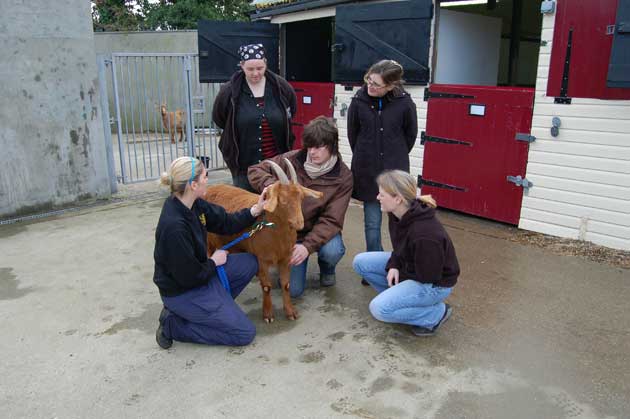Forget agricultural training - today's trendy subjects are horticulture and pets

Its name may not roll off the tongue easily but medicinal horticulture is the course to be on since the BBC began its series Grow Your Own Drugs this year.
Inquiries and enrolment to the course at Hadlow, the land-based college in Kent, have more than doubled since the botanist James Wong started his weekly television guide to using plants as remedies.
Colleges are used to the fads and fancies that people acquire from the media but the craze for horticulture is being fed by another source – redundancies in banks and the City. A lot of career changers are showing interest, says Alan Harvey, the lecturer in charge of the BSc and HND courses in medicinal horticulture delivered with the University of Greenwich.
"It is such a unique course which opens many different doors and attracts people who have been stuck in a job they don't necessarily find very fulfilling," says Harvey. "Most people find growing crops quite exciting but it is really important that our students understand we are not training people to be herbalists but concentrating on producing tinctures and chemicals and finding the most efficient way of producing crops, which is what the industry needs."
The more traditional agricultural courses are still there, training the farmers of the future, but colleges and universities are increasingly offering a fresh range of options. Moulton College in Northampton has added foundation degrees in sports turf management, horticulture and garden design and arboriculture in the last three years.
Land-based studies went through a lull at the end of the last century and the early 2000s but enrolments have increased steadily for the last four years says Robin Chapman, Moulton's deputy principal for curriculum and quality. "Recruitment in land-based subjects has gone up this year and we think it is partly due to people wanting to sit out the recession and come out with better qualifications."
People tend to confuse training for specific jobs in agriculture with higher education, which is broader and management based, says Richard Jopling, the spokesman for Harper Adams University College in Shropshire. "When you mention land-based studies, people's minds tend to close down and they think of everyone milking cows, but it is much wider than that," he explains.
Though some people mock "trendy" degrees, such as leisure outdoor adventure, the college has an employment rate of 99.1 per cent of its students six months after graduation.
Agriculture courses now have to be more aware of conservation issues, according to Jeremy Strong , the head of higher education at Writtle, the agricultural college in Essex. More and more people are recognising that we cannot take food for granted and that the "farm to fork" route is something everyone in the industry has to understand, he says.
Interestingly, although land-based studies is usually associated with the countryside, the biggest boom is in London. Capel Manor College, which has six bases around the capital, says looking after animals and gardens is big business. According to Steve Dowbiggin, its chief executive, the high population density of London brings with it a high density of pets and gardens. "There is a major shortage of people with qualifications to work with pets in London and a similar shortage of florists," he says. "At the moment the high level of demand for qualified people to look after trees and gardens in London doesn't seem to have been dented by the recession."
Capel Manor is experiencing a significant increase in demand for its courses. For adults the applications are already 5 per cent over its quota for this year. "Some people are being made redundant and deciding they didn't actually like the job they were doing and they now want to do something they enjoy," he says.
Another group are the partners of people in jobs that could be at risk who want to prepare to earn their own incomes. One of them, Julie Phipps, a biomedical scientist married to the credit controller of an international bank, went back to college to study garden design and then set up a landscape garden business when there was a spate of banking redundancies in the mid-1990s.
She launched her own garden design business but Capel College lured her back and now she is the head gardener, responsible for a team of seven at the Enfield headquarters. Next month she will be presenting her design for a cottage garden at the Chelsea Flower Show.
Join our commenting forum
Join thought-provoking conversations, follow other Independent readers and see their replies
Comments